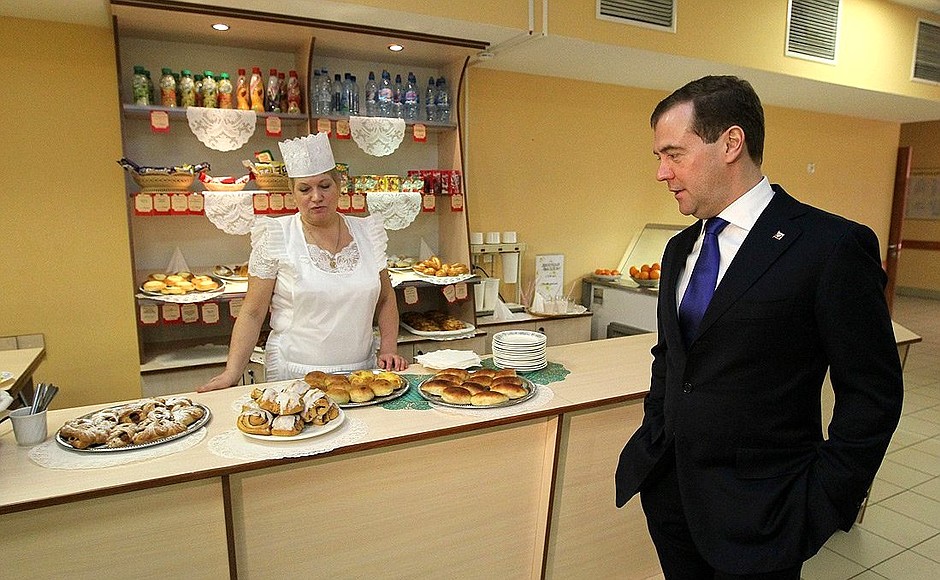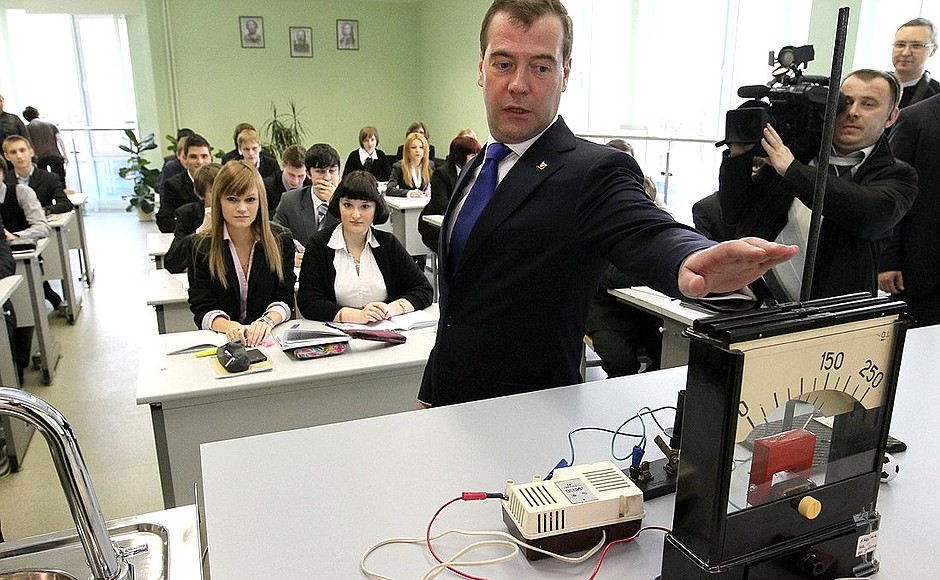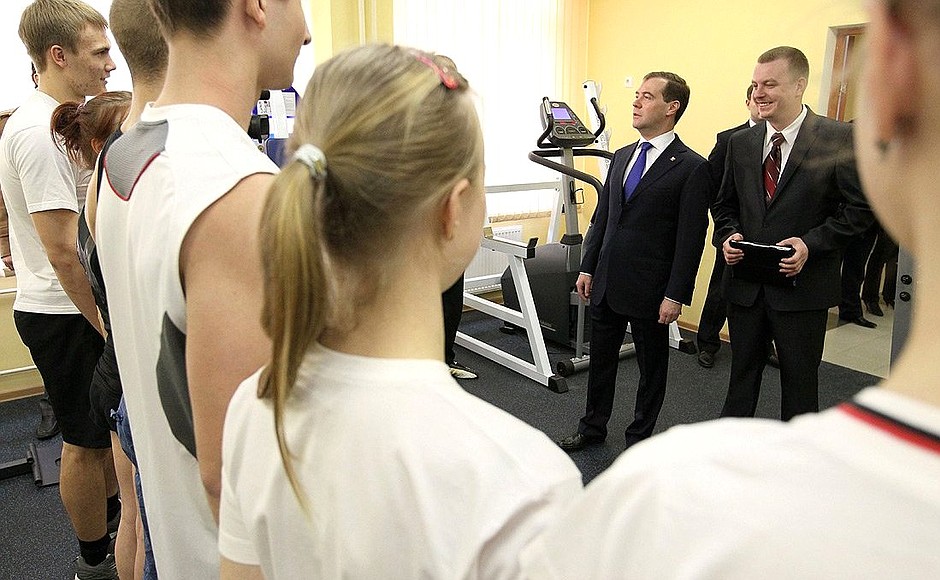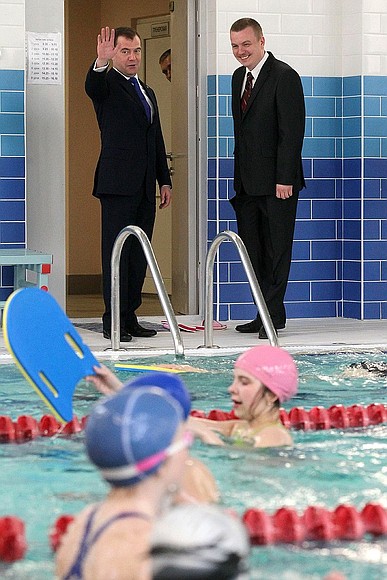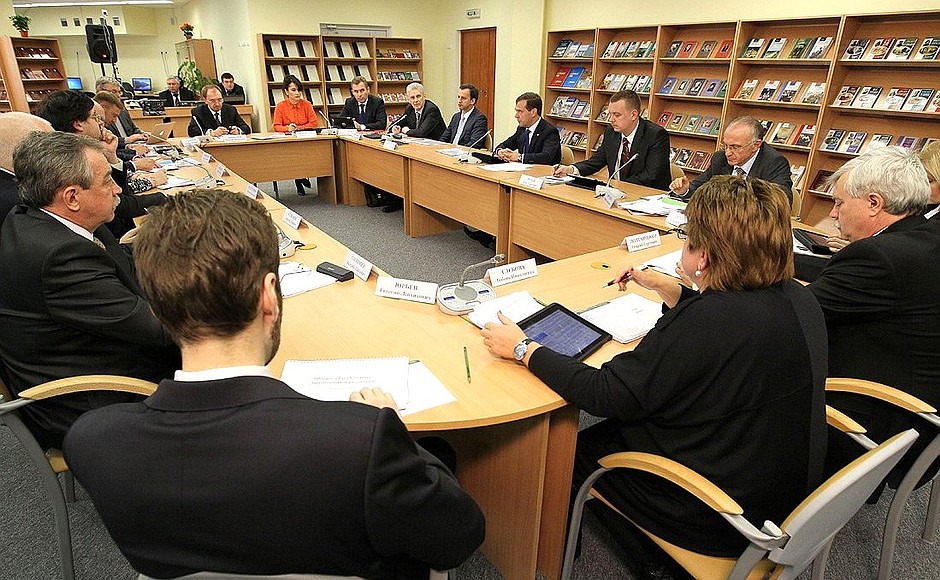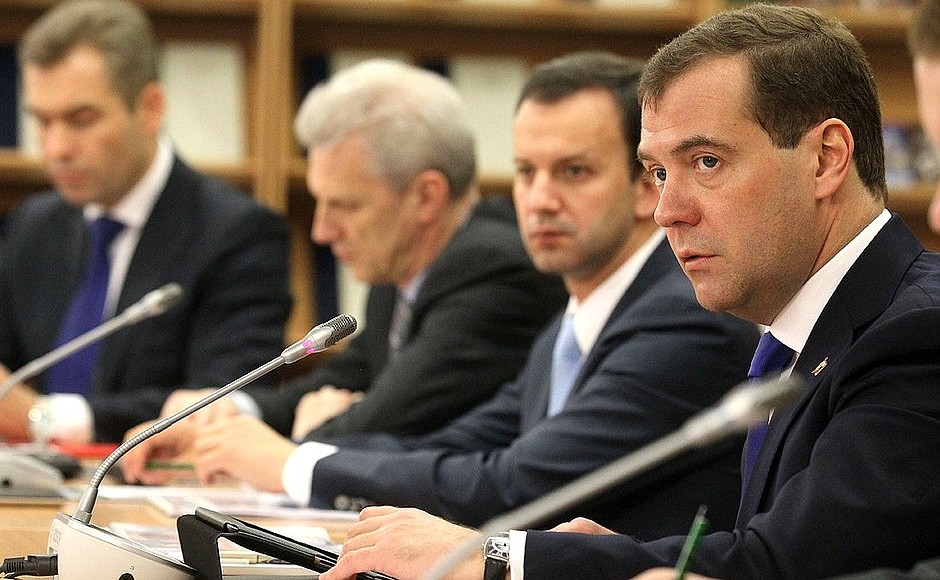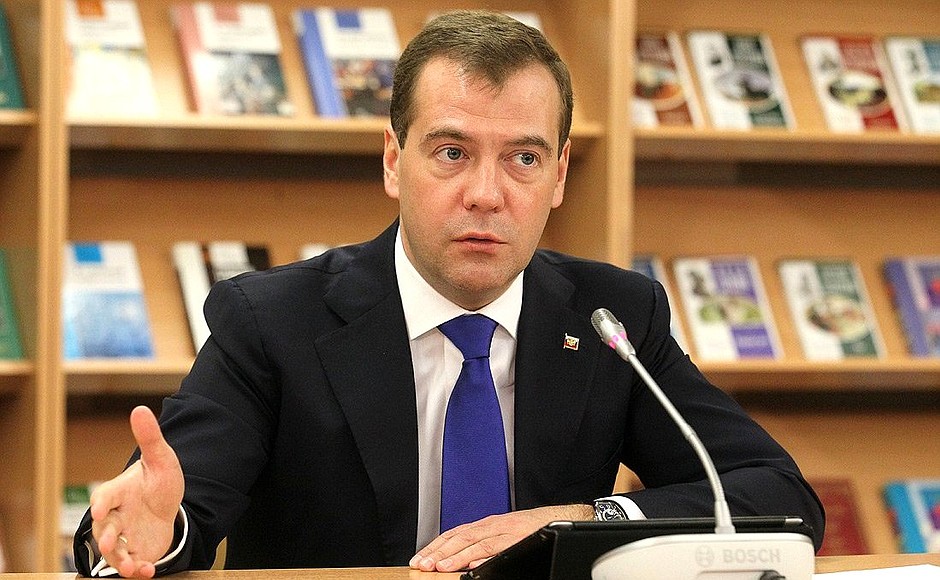Improving the education system as part of Russia’s Social and Economic Development Strategy through to 2020, enhancing teachers’ working conditions, implementing the national system for identifying and developing young talents, and upgrading the regulatory framework, control procedures and the organisation of the National Final School Exam were the main issues discussed.
Before the meeting, Dmitry Medvedev visited School No. 126 and met with its students. The President inspected the sports and assembly halls, the swimming pool and canteen, and sat in on a physics lesson.
* * *
President of Russia Dmitry Medvedev: Good afternoon, colleagues,
This meeting today is part of the debate on Strategy 2020 and the issue we will address, as you might guess, is school education. We are trying to shape a modern policy in this area. Whether our efforts have been successful or not is for society to decide. Before I give you the floor and listen to your reports, I would like to share a few thoughts, though I will not claim that these are comprehensive solutions.
See also
First, it is vitally important that our schools don’t just have strong teaching staff but also have good principals. Isn’t that right, Mr Rozov? I am sure that Pavel Rozov [Principal of High School No. 126], who is sitting here next to me, is an excellent principal, and the youngest as well. He said to me: “You are the youngest President (though I am not the youngest President any more), and I am the youngest school principal.” Certainly, a great deal depends on the principal’s personality.
It would be best if principals were elected on a competitive basis with a public presentation of a development programme for the educational institution, so that everyone can see what the candidates will work on if elected. I also think it would be good to introduce time limits on the employment contracts and conditions for the contract’s termination – not because we do not respect the principals of educational institutions, but simply because there must be some evaluation criteria in place. School principals’ performance must be evaluated on the basis of specific criteria, taking into account the views of parents and students.
”Teachers measure their achievements by the number of talented students, and the nationwide system for identifying and developing young talents depends to a great extent on teachers’ moral values and knowledge.“
I support the idea that has been voiced on establishing a self-regulatory organisation for school principals. In general, we tend to delegate powers to self-regulatory organisations. This is a practice widely accepted around the world, when the organisation independently determines the best, and, on the other hand, is freed from the worst. Therefore, this idea has been voiced and such an organisation could be established. Incidentally, it could also be charged with conducting performance reviews, the certification of various internship sites, and the organisation's responsibility for its decisions must be formalised. Let's discuss it.
The second issue we must touch on concerns salaries. Today teachers’ salaries do not differ from the average for each region, although they may be slightly higher or lower in different regions. On the whole, we have successfully solved this problem. Nevertheless, the efforts in this area must continue. We must also think about ways to improve teachers’ working conditions relative to the standards of each particular region, and to provide schools with modern equipment. Our meetings are held in different places. The school we visited today is certainly top level but there is a huge number of very different schools, as we all know, and we visit such schools as well. Teachers must be encouraged to continue their education as it is essential to go on learning over the course of our entire lives.
Another topic that probably causes great concern to many educators is the teachers’ image in the media, especially in the context of different new films and television programmes. In any case, I do not want to condemn or criticise anybody (it is not my habit to judge the merits of a work of art), but in any case, we must not weaken the public recognition of teachers as one of the most important professions, and we must also pay attention to this.
Teachers measure their achievements by the number of talented students, and the nationwide system for identifying and developing young talents depends to a great extent on teachers’ moral values and knowledge. Let me remind you that on April 3, I signed the relevant strategy. I do not overestimate its importance because every strategy is effective only when there are resources for its implementation, otherwise it is just empty words. I do believe, however, that the strategy sets the right priorities. Its real content will depend on how well it will be put into practice in each particular region of our country.
Next issue: an educational website will be launched in July 2012, where students, parents and teachers will find exhaustive information on schools, clubs, organisations, further education, and learning opportunities for children and young people of any age. I hope that this resource will be in demand and will become one of the major information venues of the new national education system.
”Educational website will be launched in July 2012, where students, parents and teachers will find exhaustive information on schools, clubs, organisations, further education, and learning opportunities for children and young people of any age. I hope that this resource will be in demand and will become one of the major information venues of the new national education system.“
I cannot leave out the subject of the National Final School Exam (EGE). I don’t know if there was a wish to create a stir in society on the subject of education, but we certainly managed it with the EGE. If we didn’t have the exam, we should have come up with it now. But seriously speaking, there is one thing I can state with certainty whoever I am speaking with, be it here or during a meeting with our colleagues, for example, from the Communist Party, who have criticised the EGE harshly. I firmly believe that the new system has more advantages than disadvantages. This is not because I particularly like this system although it is very close to global standards in education, but I have come to believe this as a result of my conversations with the vast majority of teachers and students. We must bear in mind what was going on in the system before the introduction of the EGE. Maybe this does not apply to the same extent to St Petersburg, although present here is Rector Nikolai Kropachev [Rector of the St Petersburg State University], and Rector Yaroslav Kuzminov [Rector of the National Research University Higher School of Economics], but it is especially relevant for the provinces.
We are currently working on improving the regulatory framework for the EGE, the exam’s organisation procedures and monitoring compliance with the procedures. Naturally, we must – and this is a national challenge –increase the responsibility of the heads of educational institutions, school principals and teachers for the violations committed in conducting the EGE, the violations that are widely written about and which are very easy to prove. We must ensure the presence of public observers at each venue where the exam is conducted and at meetings of dispute commissions. This is also a matter I propose that we discuss. This is a good start and it may improve the situation with the EGE in many cases and in many regions of our country. I believe public observers are a beneficial institution. They shouldn’t be limited to observing elections. There shouldn’t be hunger strikes following the EGE every year. I think it would be a useful measure. We could also think about expanding the technological options we use for the EGE.
There is one more point I would like to mention: the opportunity to take the EGE in a digital format, using a computer. I think it would also be a very positive step. That would mean that there will be no more exam papers lying around on students’ desks, and the transition to modern technology in schools should be accelerated. But I want to say straight away that if we do switch to a digital format, we must be absolutely sure that the system works perfectly. Because, however much you criticise exam papers, they are much harder to forge than digital results, that is, the information entered into the computer. I have seen a lot of exam papers in my life, at the time when my students at the university took exams; students have a lot of ways to cheat with exam papers, both at university and at school, but it still takes work. At least the person who has written something down has processed this information in a way, whereas if all it takes is one click and you have the result… Basically, we must make sure it doesn’t become like the situation with driving tests. You all know what I mean.
Let's get to work.
<…>
